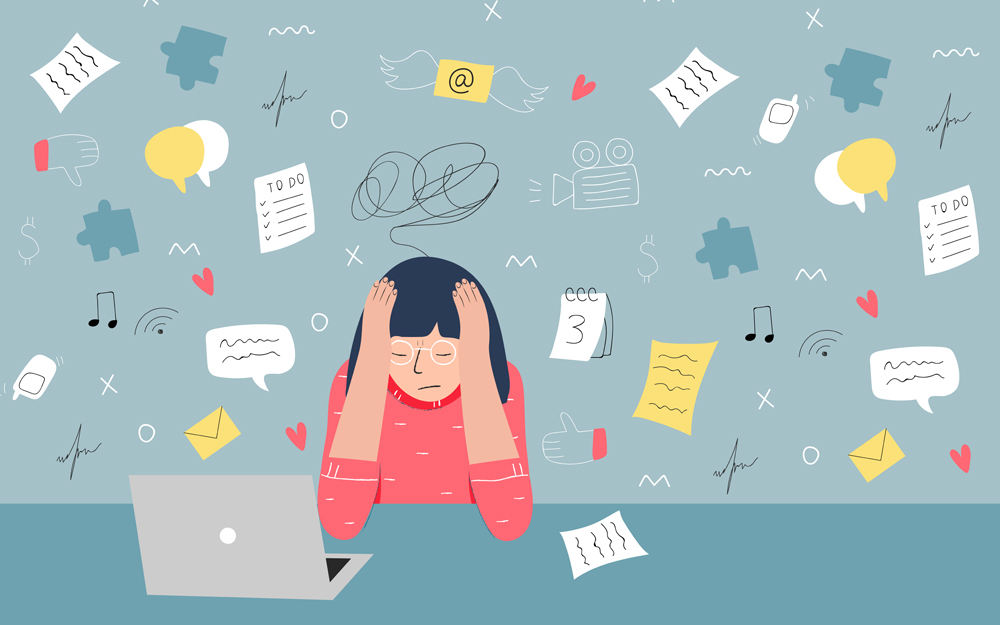What is Stress?

Stress is the normal physical and emotional reaction of your body to an outside event or object which makes you feel threatened or overwhelmed. When the brain decides that an event is a hurdle or obstacle of some sort, it sends several chemical signals to parts of your body, which react accordingly to deal with the situation at hand. Some of the earliest examples of stress in humanity’s environment were predators.
Upon sensing such, the brain is responsible for kicking the central nervous system into high alert, inciting every living creature’s “fight or flight” response. The chemicals, including adrenaline, are taxing for your system; as more blood is sent to your muscles, your eyes become sharper, your ears keener. This response may be great for a minute or two where survival is on the line, but the long-term effects of stress on the body can be exhausting and dangerous.
The Triggers
While most people no longer face the carnivorous predators of their ancestors, many of the triggers remain deeply embedded in our evolutionary roots. Today, stress is usually triggered by change, which can be sudden or long-term.
Changes can be mild and harmless—such as riding a roller coaster or missing a flight—or they can be somewhat severe life-altering, or dangerous, such as in the event of a car accident or the loss of a job. Triggers may be different for individuals. While some may adapt more easily to a small change, others may have more difficulty accepting the shift from what they’ve known.
Three Types of Stress and Their Effects
There are three widely accepted forms of stress. They include routine stress, which is the stress of day-to-day life including the demands of work, home, and the general human condition; negative change stress, which is characterized by a sudden change that affects the usual schedule of a person, such as a divorce; and traumatic stress, which is brought on by exposure to violence or the death of a loved one. Each level of stress provides its own challenges and treatments.
Routine stress is generally long-term and can lead to:
- Headaches
- Exhaustion
- High blood pressure
- Anxiety
- Or general feelings of unhappiness or irritability.
The usual treatment for milder cases usually includes time away from the sources of stress, which could mean a vacation, an enjoyable activity, or meditation to help alleviate the body’s response. This type of stress is best dealt with through a combination of rest and usually resolves itself.
Negative change stress begins suddenly and may be intense for the first few hours, days, or weeks following the event. These major shifts in the life experience of someone are usually expressed through trouble sleeping, migraines, mood swings, anger, depression, or loss of appetite. It may be necessary to seek help addressing this type of stress by trusting friends or family, planning out a course of action, or speaking with a support group.
Traumatic stress has severe and long-lasting implications for those experiencing it. Brought on by a sudden, life-shattering event, traumatic stress can lead to depression, anxiety, insomnia, and thoughts of suicide.
Post Traumatic Stress Disorder is an all too common diagnosis for those faced with violence, including crime survivors, police officers, and soldiers. In more severe cases, it may be important to seek professional help and even rely on prescription medication to minimize the effects of stress on the mind and body.
Trending Health Topics
- ADHD
- Allergies
- Arthritis
- Bipolar Disorder
- Bunions
- Car Accidents
- Chron's Disease
- Common Cold
- COPD
- Depression
- Dry Skin
- Dry throat
- Eczema
- Fungal Infection
- GERD
- HIV/AIDS
- Hypertension
- Irritable Bowel Syndrome (IBS)
- Multiple Sclerosis
- Osteoarthritis
- Psoriasis
- Rheumatoid Arthritis
- Skin Disorders
- strep throat
- Type 2 Diabetes
- Uncategorized